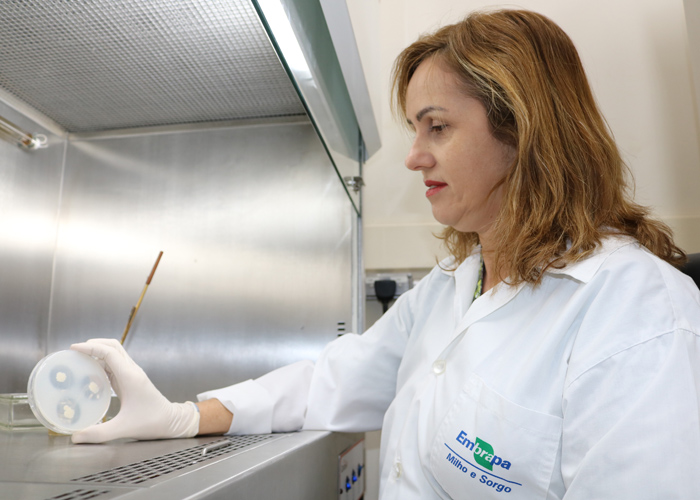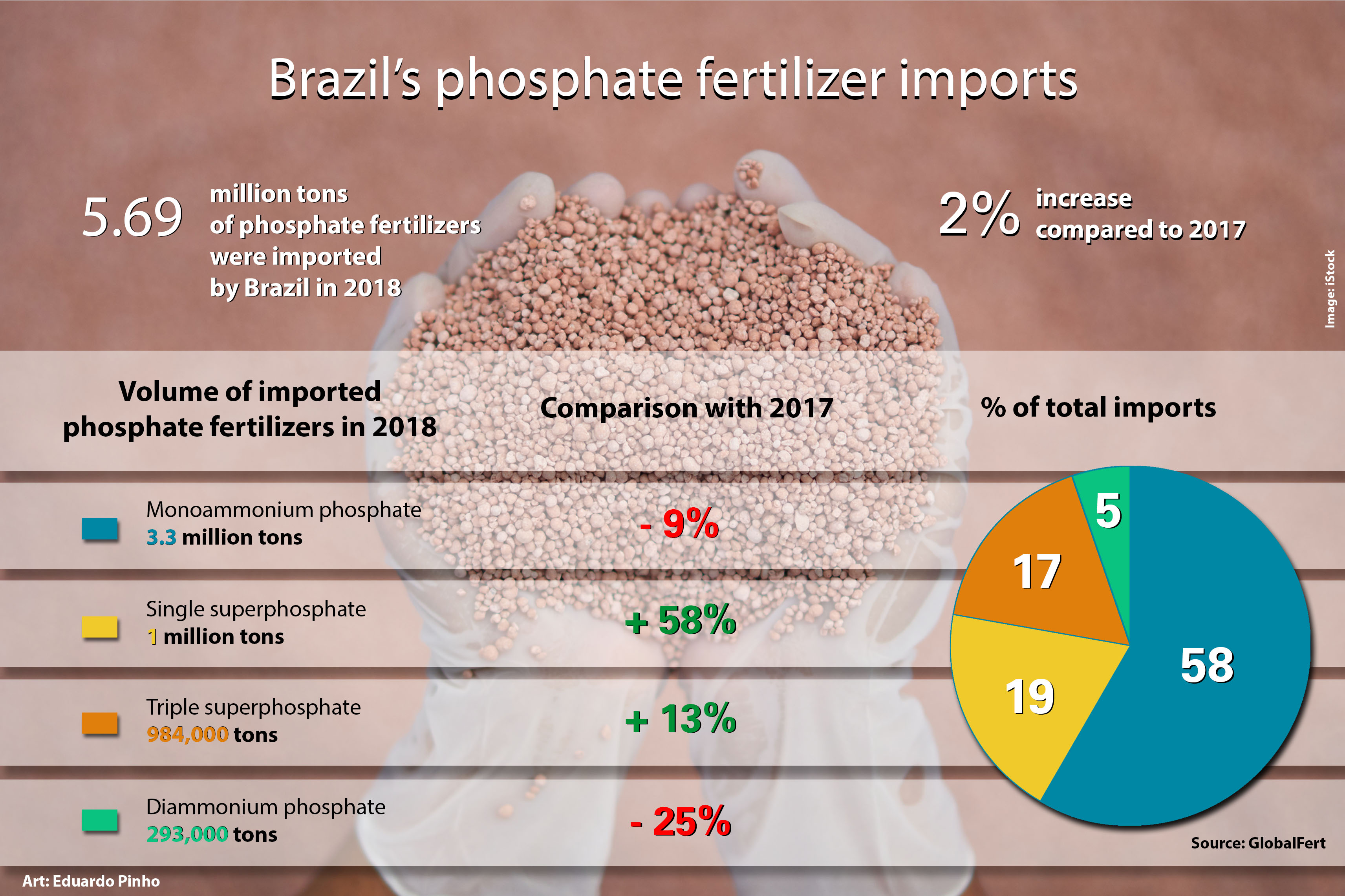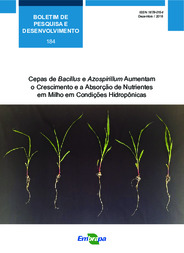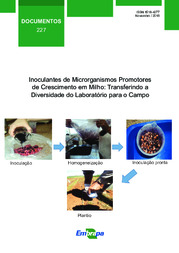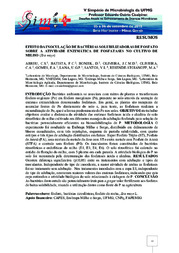Product with Brazilian technology can reverse dependence on foreign phosphorus fertilizers
Product with Brazilian technology can reverse dependence on foreign phosphorus fertilizers
A public-private partnership between Embrapa and the company Bioma is the first to offer an inoculant fully developed from Brazilian technology for the domestic market. The product named BiomaPhos combines sustainability and productivity because it is biological - produced from two bacteria identified by Embrapa, one in the soil and the other in maize - and capable of increasing plant absorption of phosphorus, which can change the scenario of high Brazilian dependence on the international fertilizer market.
Over 5.5 million tons of importsIn 2018, according to data by GlobalFert, one of the main suppliers of strategic information in the segment, Brazil imported 24.96 million tons of NPK (nitrogen, phosphorus and potassium) fertilizers, a volume that was 4% higher than in 2017. Phosphorus fertilizers alone, according to the consulting service, account for 23% of such sum, totalling 5.69 million tons imported in the period. |
That has prompted Embrapa to research, with the detection of the bacteria that are able to solubilize or to make phosphorus available. This mineral is indispensable for plant growth and production, since it interferes in the processes of photosynthesis, respiration, and energy storage and transfer. Once this stage was concluded, the company Bioma established the large-scale production indicators and the product formulation that allowed for better survival of the inoculant on the shelves and in field conditions.
“Strains of the Bacillus subtilis (CNPMS B2084) and Bacillus megaterium (CNPMS B119) bacteria are able to have a higher amount of phosphorus be absorbed by the roots, receiving in exchange compounds that are fundamental for bacterial growth, like carbon sources, especially sugars and organic acids”, explains Christiane Paiva, a researcher in the area of Soil Microbiology at Embrapa Maize and Sorghum, responsible for the research that culminated with the launch of the commercial product.
The researcher Christiane Paiva talks about the inoculant's potential to increase plants' absorption of phosphorus
Average yield increases near 10%
Results of experiments with maize crops conducted in different Brazilian regions show average grain yield increases of about 10%, which can correspond to an average gain of up to ten bags per hectare. “These experiments assessed inoculation combined with reduced triple superphosphate fertilization, which can reduce farmers' expenses with synthetic fertilizers”, the researcher Christiane Paiva underscores. Another differential of the use of the inoculant is a significant reduction in the indicator of CO2 emission into the atmosphere. “Hence the results show that it is possible to use a clean, low-cost technology in maize crops, contributing to sustainability in agriculture, without losses for the environment”, she stresses.
Christiane Paiva underscores the inoculant's technical details, which is unprecendeted in the Brazilian market, and it was developed from tropical microorganisms.
Differentials
The inoculants produced with such microorganisms present lower cost, do not cause environmental damages and can be used to supplement fertilizers. “Moreover, the addition of inoculants into the soil can speed up nutrient cycling, increase the release of phosphorus present in organic matter and biologically enrich the soil. Moreover, these inoculants supply the plants with other growth promotion mechanisms”, Paiva adds. Studies led by Embrapa reveal that there is a billionaire supply of phosphorus in the soil, that is inert and cannot be used by plants.
The head of R&D of Embrapa Maize and Sorghum, Sidney Parentoni, highlights that the inoculant is an innovation available for farmers in the Brazilian market.
“In some no-till farming soils, about 88% of the phosphorus is found to be in an organic form, unavailable to be absorbed by the roots, and needs to be mineralized for this purpose. The phosphate-solubilizing bacteria can make the element available for the plant, and agronomically work on such large supply present in nature”, the researcher interprets. “In the case of maize, because it is a short-cycle plant and highly demanding in terms of nutrients, the use of the inoculant complementarily to fertilization has been gaining momentum. There are concretely higher production and productivity gains with the use of the product”, he reinforces.
Another advantage is the stability of the inoculant because of the capacity to form spores of the selected bacteria, allowing adaptation to extreme conditions such as temperatures, pH or exposure to pesticides.
More than US$1.2 bi in imported fertilizersThe growing increase in maize production in Brazil - the country should have a record harvest estimated at 99.3 million tons according to the National Food Supply Corporation (Conab), which makes it the world's second largest exporter, only behind the United States - implies there have been gains in productivity indicators. The State of Mato Grosso, nicknamed Brazil's granary, concentrates national production, with harvest estimates of over 31 million tons in the 2018/2019 crop year, according to Conab. “Such Cerrado region has predominantly acid, nutrient-poor soils, especially regarding phosphorus, which has low mobility”, Paiva explains. The need to apply high doses of fertilizers to meet the crop's requirement translates into higher foreign dependency, according to the researcher Ivanildo Evódio Marriel, a team member, since more than 50% of phosphate fertilizers are imported. In the first half of 2019 alone, according to data from the Ministry of Economy, Industry, Foreign Trade and Services published by the site Farmnews, a news channel devoted to Brazilian agribusiness, fertilizer imports reached the highest level in history of the country: US$ 1.25 billion, an amount 67.4% higher than the same the period in 2018. “This increase in imported fertilizer prices has contributed to the increase in grain production costs in the country”, stated a note published in the Farmnews web portal.. The juncture is worsened by the trend of price increases. According to data from the Institute of Agricultural Economics (IEA), the average price per ton of simple superphosphate this March was of R$ 1,378.81, an amount 8.6% higher than compared to the same month in 2018. Volatile phosphate fertilizer prices create unreliability for farmers in regions where the resource is scarce, and price shocks can render the input unaffordable to low- income farmers”, analyzes the researcher Christiane Paiva. An Embrapa study has revealed that almost half of the amount of phosphorus applied in agriculture as inorganic fertilizer in the last 50 years remains in the soil, constituting a reserve whose worth is higher than US$ 40 billion - which can help Brazil prepare against a possible future scarcity of the nutrient. “Another problem caused by the accumulation of phosphorus in the soils is the contamination of water sources, as well as the increase in the potential for eutrophication”, Paiva reinforces. Eutrophication consists in nutrient excess, especially the nitrogen- and phosphorus-based ones, in surface waters, which promotes higher growth of seaweeds and other aquatic plant species. “The practice of inoculation, in contrast, is a strategic alternative to the natural biological recovery of soil quality, adding beneficial microorganisms with multiple stimulating functions for the plants besides the obvious productivity gains”, he ponders. |
Several countries have already embraced the technology
In Brazil, the use of inoculants to supply plants' phosphorus demand is incipient. “However, countries like Argentina, Canada, South Africa, India, Australia, Phillipines and the United States have invested in a line of bioproducts aiming at reducing the indiscriminate use of phosphate fertilizers, and also to increase the offer of products that efficiently increase plant tolerance to such stresses”, the researcher highlights.
As for the acquisition of another fundamental element - nitrogen - rhizobium- and and Azospirillum-based inoculants have dominated the biological input market both for grains and for pulses, with significant reduction of the use of nitrogen fertilization, especially in the successful case of soybean crops, according to Paiva.
Translation: Mariana Medeiros
Guilherme Viana (MTb 06.566/MG)
Embrapa Maize and Sorghum
Press inquiries
milho-e-sorgo.imprensa@embrapa.br
Phone number: +55 31 3027-1905
Further information on the topic
Citizen Attention Service (SAC)
www.embrapa.br/contact-us/sac/

